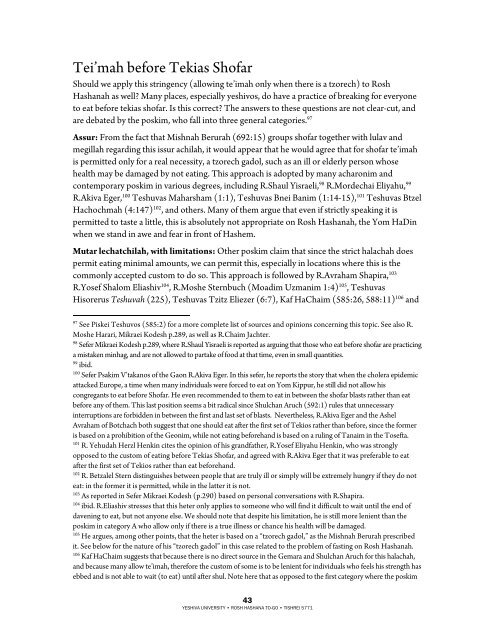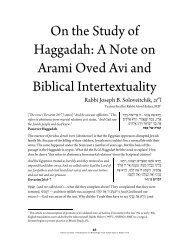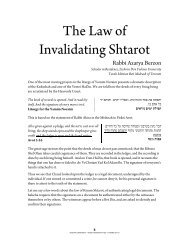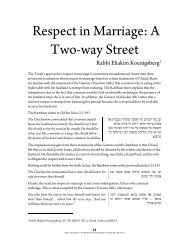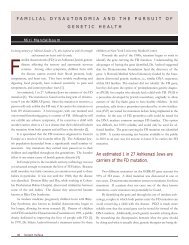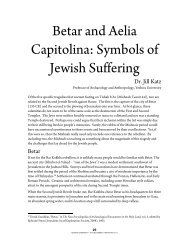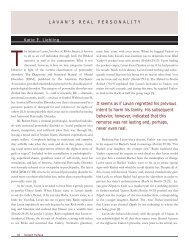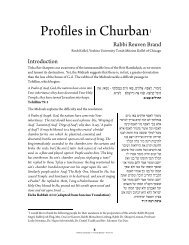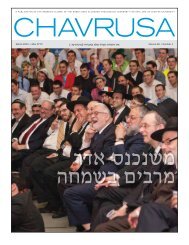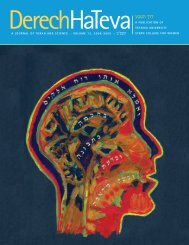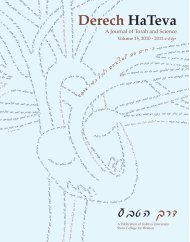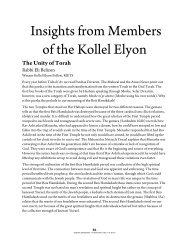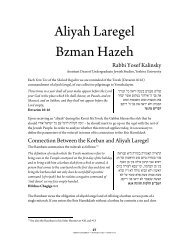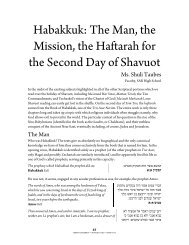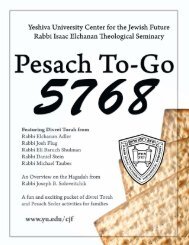YESHIVA UNIVERSITY • ROSH HASHANA TO-GO ... - YUTorah.org
YESHIVA UNIVERSITY • ROSH HASHANA TO-GO ... - YUTorah.org
YESHIVA UNIVERSITY • ROSH HASHANA TO-GO ... - YUTorah.org
You also want an ePaper? Increase the reach of your titles
YUMPU automatically turns print PDFs into web optimized ePapers that Google loves.
Tei’mah before Tekias Shofar<br />
Should we apply this stringency (allowing te’imah only when there is a tzorech) to Rosh<br />
Hashanah as well? Many places, especially yeshivos, do have a practice of breaking for everyone<br />
to eat before tekias shofar. Is this correct? The answers to these questions are not clear-cut, and<br />
are debated by the poskim, who fall into three general categories. 97<br />
Assur: From the fact that Mishnah Berurah (692:15) groups shofar together with lulav and<br />
megillah regarding this issur achilah, it would appear that he would agree that for shofar te’imah<br />
is permitted only for a real necessity, a tzorech gadol, such as an ill or elderly person whose<br />
health may be damaged by not eating. This approach is adopted by many acharonim and<br />
contemporary poskim in various degrees, including R.Shaul Yisraeli, 98 R.Mordechai Eliyahu, 99<br />
R.Akiva Eger, 100 Teshuvas Maharsham (1:1), Teshuvas Bnei Banim (1:14-15), 101 Teshuvas Btzel<br />
Hachochmah (4:147) 102 , and others. Many of them argue that even if strictly speaking it is<br />
permitted to taste a little, this is absolutely not appropriate on Rosh Hashanah, the Yom HaDin<br />
when we stand in awe and fear in front of Hashem.<br />
Mutar lechatchilah, with limitations: Other poskim claim that since the strict halachah does<br />
permit eating minimal amounts, we can permit this, especially in locations where this is the<br />
commonly accepted custom to do so. This approach is followed by R.Avraham Shapira, 103<br />
R.Yosef Shalom Eliashiv 104 , R.Moshe Sternbuch (Moadim Uzmanim 1:4) 105 , Teshuvas<br />
Hisorerus Teshuvah (225), Teshuvas Tzitz Eliezer (6:7), Kaf HaChaim (585:26, 588:11) 106 and<br />
97 See Piskei Teshuvos (585:2) for a more complete list of sources and opinions concerning this topic. See also R.<br />
Moshe Harari, Mikraei Kodesh p.289, as well as R.Chaim Jachter.<br />
98 Sefer Mikraei Kodesh p.289, where R.Shaul Yisraeli is reported as arguing that those who eat before shofar are practicing<br />
a mistaken minhag, and are not allowed to partake of food at that time, even in small quantities.<br />
99 ibid.<br />
100 Sefer Psakim V’takanos of the Gaon R.Akiva Eger. In this sefer, he reports the story that when the cholera epidemic<br />
attacked Europe, a time when many individuals were forced to eat on Yom Kippur, he still did not allow his<br />
congregants to eat before Shofar. He even recommended to them to eat in between the shofar blasts rather than eat<br />
before any of them. This last position seems a bit radical since Shulchan Aruch (592:1) rules that unnecessary<br />
interruptions are forbidden in between the first and last set of blasts. Nevertheless, R.Akiva Eger and the Ashel<br />
Avraham of Botchach both suggest that one should eat after the first set of Tekios rather than before, since the former<br />
is based on a prohibition of the Geonim, while not eating beforehand is based on a ruling of Tanaim in the Tosefta.<br />
101 R. Yehudah Herzl Henkin cites the opinion of his grandfather, R.Yosef Eliyahu Henkin, who was strongly<br />
opposed to the custom of eating before Tekias Shofar, and agreed with R.Akiva Eger that it was preferable to eat<br />
after the first set of Tekios rather than eat beforehand.<br />
102 R. Betzalel Stern distinguishes between people that are truly ill or simply will be extremely hungry if they do not<br />
eat: in the former it is permitted, while in the latter it is not.<br />
103 As reported in Sefer Mikraei Kodesh (p.290) based on personal conversations with R.Shapira.<br />
104 ibid. R.Eliashiv stresses that this heter only applies to someone who will find it difficult to wait until the end of<br />
davening to eat, but not anyone else. We should note that despite his limitation, he is still more lenient than the<br />
poskim in category A who allow only if there is a true illness or chance his health will be damaged.<br />
105 He argues, among other points, that the heter is based on a “tzorech gadol,” as the Mishnah Berurah prescribed<br />
it. See below for the nature of his “tzorech gadol” in this case related to the problem of fasting on Rosh Hashanah.<br />
106 Kaf HaChaim suggests that because there is no direct source in the Gemara and Shulchan Aruch for this halachah,<br />
and because many allow te’imah, therefore the custom of some is to be lenient for individuals who feels his strength has<br />
ebbed and is not able to wait (to eat) until after shul. Note here that as opposed to the first category where the poskim<br />
43<br />
<strong>YESHIVA</strong> <strong>UNIVERSITY</strong> <strong>•</strong> <strong>ROSH</strong> <strong>HASHANA</strong> <strong>TO</strong>-<strong>GO</strong> <strong>•</strong> TISHREI 5771


